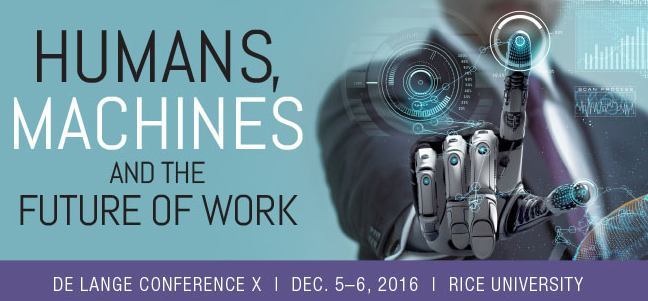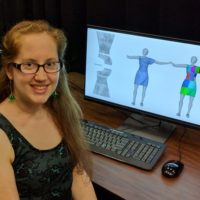De Lange Conference on Humans, Machines, and the Future of Work

Recently, CRA was a sponsor and participated in the De Lange Conference on Humans, Machines, and the Future of Work, which focused on the impact of the amazing technologies being developed by the computing research community on the nature of work and employment. The conference was held at Rice University with primary funding from the De Lange Conference Fund at Rice, which brings top experts and major figures to its campus in order to focus on a topic of great concern to society.
It is clear that our technologies are having major impact but much less clear is exactly what this impact will be. Rather than hosting a retrospective conference at some point in the future, the idea was to begin to get a handle on the anticipated impact. Communications of the ACM published an excellent summary of the conference.
“While the technologists participating in the De Lange Conference on Humans, Machines, and the Future of Work at Rice University in Houston last week were bullish on the societal benefits of robotics and artificial intelligence (AI), speakers with backgrounds in economics and the humanities suggested we need to make the right choices to integrate these technologies into the world of work without devaluing the role of people.Rice president David W. Leebron underscored the increasing importance of education, and continuing education, to keep up with technology trends, in the labor markets, observing that of 11.6 million jobs added to the U.S workforce since the economic rebound in 2010, “99% went to the educated.”
In the context of the major question underlying the conference, Leebron wondered, “what will we do in a world in which machines make machines … what will humans do in that world?”
Conference organizer and chair Moshe Vardi, Karen Ostrum George Distinguished Serve Professor of Computational Engineering, professor of computer science and director of the Ken Kennedy Institute for Information Technology at Rice (as well as editor-in-chief of CACM), said the issue to consider is not that manufacturing has fled the U.S., but that jobs have been lost as manufacturing has become increasingly automated. Rather than simply allowing this to happen, he said, “the future of work deserves a broad conversation,” and should be an issue of public policy, as well as an academic topic.”



